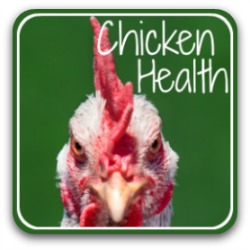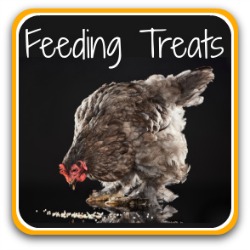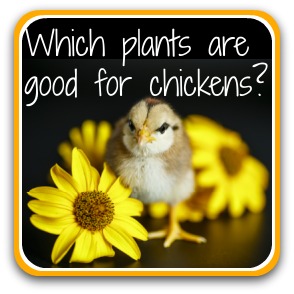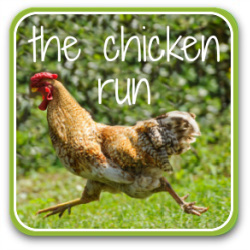Vitamins for chickens: are supplements a necessary part of a healthy poultry diet?
Chickens are relatively easy to care for. Following the globally adopted 5 welfare needs makes sure they lead the healthiest life.
But what part, if any, should additional vitamins and minerals play? How do we make sure there's enough in our chickens' everyday diet – and what happens if they don't get enough?
My friendly Chicken Digest group were recently given this list of vitamins and minerals as a free, downloadable "cheat sheet". It's instantly accessible so that, if your chickens become unwell, you can check which would help them recover.
It doesn't exist anywhere else.
For that and more helpful, instantly useable giveaways, why not sign up to my newsletter list?
The five welfare needs of chickens, as outlined in European legislation and adopted by animal charities(1), provide an excellent basis for making sure our flocks live a healthy, happy life.
One of the most critical sections of those standards is:
"Freedom from hunger and thirst by ready access to fresh water and a diet to maintain full health and vigour"(2).
The most important part of any chicken diet, of course, is a good quality feed, balanced to meet their needs at different times of life.
Those foods, chosen carefully, should give your flock everything they need in terms of vitamins, minerals and other micro-nutrients.
But it's important to know what additional vitamins and minerals can offer chickens, particularly at times when they may need extra to boost their system: after a predator attack, for example, or in times of extreme heat, or when they're moulting.
Remember, though: other foods, particularly treats, should be offered only after they have had their own.
The following tables summarise the main vitamins and minerals, explains what a lack might mean and how to watch for signs of deficiency, and gives examples of foods which contain that particular element.
And, in promoting healthy foods which can help fight disease, they also fulfill another welfare need: for chickens to be...
"protected from pain, suffering, injury and disease."
Please note: This page is written as general information only. It is not intended as medical or veterinary advice and should not be taken as such.
If you're worried about your chickens' health, you should always see your veterinarian.
The major vitamins for chicken health.
Vitamins, minerals and antioxidants can have a different effect on chickens than humans. This list is a summary of their main benefits of for poultry, evidenced by peer-reviewed research(1).
Vitamin A for chickens
- Boosts the immune system
- Regenerates cells
- Helps bone development
- Keeps throat, eyelids and nostrils moist
- Helps deal with stressful situations such as cold weather and moulting
- Often deficient in poultry diets
- Blood spots in eggs can indicate deficiency.
Lack leads to...
- Poor immune response
- Damage to eyes, nose and throat
- Respiratory infections, specifically infectious Coryza
- Can prove fatal quickly.
Found in...
- Dandelions: which also contain potassium, iron and calcium.
- Fish: particularly oily fish such as mackerel. Find a poultry fish recipe here.
- Eggs: making sure chickens have adequate Vitamin 'A' equally ensures their eggs are rich in it. More about eggs and chickens, here.
- Pumpkin: one of the best sources of beta-carotene, a powerful antioxidant which converts to vitamin A in the body. Click to see more about pumpkins, including a recipe.
Vitamin B complex
(Sources: 8, 9).
- Vitamins B6 and B12 are particularly important
- Both help absorb proteins; B12 also metabolises fat and carbohydrate
- Promote healthy growth
- Contribute particularly to healthy bones and feathers
- Particularly critical for hens laying eggs for hatching
- Weight loss and convulsions indicate a lack of the 'B' vitamins.
Lack leads to...
(Sources: 8, 9, 10).
- Convulsions, wing flapping and falling over in chicks
- Reduced appetite
- Feather loss
- In adults, shrinking of wattles, comb and oviduct
- Consequent decrease in egg production in laying hens, and...
- Poor success rates in hatching; embryos dying midway through incubation.
Found in...
- Sprouting seeds, particularly lentils and mung beans
- Sweet potatoes
- Bananas, which also contain high levels of potassium and iron
- Fermented feed
- Fish and meat.
- Supports the immune system, especially in cold weather
- Protects cells against damage – it's an antioxidant
- Contributes to healthy bone and feather growth
- Essential for certain enzymes to function
- Improves the way the chicken processes the food it eats, so makes normal feed more efficient – the chicken need to east less to sustain the same – or better – level of health
- Supports the production of hormones involved in resistance to general stress levels
- Some evidence of anti-inflammatory properties
- Produces better quality egg yolk.
Lack leads to...
(Sources: 3, 9, 11).
- Increased mortality due to poor immune system response and increase in toxins, especially at times of stress
- Cell breakdown and critical illness
- Increased likelihood of staphylococcal infections
- Susceptibility to critical illness in cold weather.
Found in...
- Some plants, especially nasturtiums and marigolds
- Berries and fruits, especially strawberries and watermelon
- Rose hips
- Vegetables, especially cabbage and broccoli
- Some herbs, particularly parsley
- Fermented foods.
- Enables the absorption of calcium and phosphorous
- Therefore helps sustain strong, healthy bones and egg shells
- Contributes to improving immune system response
- Has some anti-inflammatory properties
- When Vitamin D is not available in the diet, it is taken from the chicken's bones to create stronger egg shells.
- Decreased egg production
- Small, thin or soft-shelled eggs
- Calcium spots on eggs
- Unsuccessful hatches from eggs of hens suffering deficiency
- Bent, malformed or soft beak, feet and keel bone
- Bowed legs (rickets)
- Stunted growth.
- An antioxidant which helps boost the immune system and acts to suppress free radicals
- Maintains healthy cell growth
- Protects against, but does not cure, diseases such as coccidiosis, e.coli and bronchitis
- Increases shell density
- Helps boost fertility in adult males and egg quality in females
- Increases hatch success levels
- A mother hen passes antibodies to chicks, giving immunity against infectious diseases.
- Decreased fertility in both males and females
- Poor hatchability
- Wry neck in baby chicks
- Depleted immune system with increased likelihood of disease
- Degeneration of muscular and heart condition, leading to a poultry form of muscular dystrophy, also known as "nutritional myopathy" and "white muscle disease"
- Increased mortality.
Found in...
- Generally agreed that the amounts in a good quality feed are sufficient
- Sunflower seeds and sunflower oil are one of the best sources
- Nuts, in particular almonds, pine nuts and hazelnuts
- Pumpkins and squashes, especially the seeds.
- Improves bone structure and flexibility
- Aids strong growth
- Ensures blood clotting times
- Improves hatchability of fertile eggs
- Particularly useful for older chickens.
- A poultry form of osteoporosis (thin bones) leading to increased fractures
- Thin blood with poor clotting times and increased risk of hemorrhage
- Increased risk of bruising and damage to internal organs
- Increased chick mortality at a late stage of incubation.
Found in...
- Leafy green vegetables such as lettuce, cabbage, spinach, brussels sprouts and broccoli
- Fresh garden peas
- Don't freeze these vegetables – it destroys vitamin K.
- Stinging nettles
- Fermented foods
- Parsley (flat-leafed).
 Hens, chicks and hatching eggs all need appropriate vitamins.
Hens, chicks and hatching eggs all need appropriate vitamins.Essential minerals for chickens.
- Increases the strength and optimal quality of eggshells
- Found to reduce the number of cracked eggs from older hens
- The chicken embryo begins to add strength to bones by absorbing calcium from its shell while still in incubation
- Stengthens bones
- An excess of calcium can lead to damage to the kidneys, particularly in chickens under 18 weeks old.
- Weakened bones, as hens deficient in calcium will take it from their bones, which leads to...
- Increase in fractures
- Lameness
- Decreased egg laying
- Soft shelled eggs, which can result in egg peritonitis
- Poor or no hatchability from fertile eggs.
Found in...
- Crushed oyster shell – the best way to make sure your hens have enough calcium
- Eggshells can also be used, but may not contain enough calcium to meet hens' needs
- Feed freely: hens will take as much as they need and males will not take any
- Soft bones of canned oily fish such as mackerel and, in particular, salmon
- Green leafy vegetables such as broccoli, kale and Chinese cabbage
- Dairy products are high in calcium, but not digested well by poultry. Avoid them.
- Transports oxygen to cells to maintain general bodily and organ health
- Ensures egg quality
- Increased nutritional value of egg yolk
- Necessary for the healthy development of baby chicks
- Anaemia, indicated by a very pale comb and wattles
- Weight loss
- Inactivity, "droopiness", lack of interest
- Decrease in egg production
- Poor hatchability of fertile eggs
- Often caused by undetected mites who feed on chicken blood.
Found in...
- Too much iron is toxic for chickens, so unless your chicken has suffered an injury and has lost a lot of blood, do not offer any supplements which have a concentrated iron component
- Otherwise, a good quality feed should provide as much iron as chickens require
- Some unprocessed foods contain traces of iron and can be given, but infrequently. They include:
- Lentils
- Sprouted seeds
- Eggs.
- Critical in the absorption of some vitamins and minerals, particularly calcium and Vitamin A
- Therefore essential for healthy bones and cell development
- For the same reason, ensures strong, high quality egg shells
- Increases protein quality of egg whites
- Improves egg yolk colour
- Enhances the immune system
- Supports healthy cell structure, improving general health and ability to withstand disease.
- Decrease in egg production
- Weak or soft-shelled eggs, more likely to break or lead to egg peritonitis
- Poor nutritional quality of eggs
- Weak, soft bones more likely to break
- More likely to succumb to stress and disease.
- Essential for eggshell thickness
- Critical to healthy development of baby chicks
- Required for healthy muscle development in all ages
- Supports healthy heart function
- Helps chickens deal with extreme heat stress.
- Reduced egg production
- Reduced shell thickness
- Poor development for chicks
- Increased potential for heart problems.
Found in...
- Pumpkins and pumpkin seeds
- Brussels sprouts
- Sweet potatoes
- Spinach
- Bananas.
Sodium
(Sources: 26,
- Welfare standards relating to food are clear that "ensuring sodium content of feed is appropriate" is critical
- Chickens need a small amount of salt, but adding salt into their diet is toxic
- 0.2% is the recommended level; 0.4% is already toxic
- Stick with a good quality feed which will have enough salt as part of its balance
- This is one mineral chickens do not need more of!
Too much leads to...
- Increased thirst
- Difficulty walking
- Diarrhea
- Breathing difficulties
- Convulsions
- Death.
Found in...
- Processed foods. Always feed your chickens natural treats
- Do not add salt into your chickens' diet!
Are other vitamin or mineral supplements necessary?
Links in this section are "affiliate links", which means that if you click and buy something, I earn a small commission at no extra cost to you.
If you're feeding your chickens a good quality feed, and adding in some of the foods mentioned in these lists as and when necessary, there should be no need for any other supplements.
In extreme temperatures, though – both very hot and very cold – or if you have a sick chicken who is unable to eat or drink, you might like to add some additional fortification.
There's a recipe for an electrolyte drink here, which uses items from your store cupboard.
Alternatively, it's possible to buy nutritional "poultry tonics" online to keep in your chicken first aid kit.
Enjoy keeping your flock healthy and happy using these minerals and vitamins for chickens!

Other pages about keeping your chickens healthy.
Sources.
A lot of "facts" you'll find on the internet are often people's individual views, based on inaccurate information repeated from poor quality sources.
The information I provide in this article and others is based not just on my own experience, but on evidenced facts from scientific, peer-reviewed research and books from highly respected and experienced poultry keepers such as Gail Damerow.
Some of the trusted sources I have used in this article are these.
1. Royal Society for the Prevention of Cruelty to Animals: The 5 welfare standards for laying hens. Pub. RSPCA, updated 2022.
2. As above: page iv.
3. Bahram Shojadoost et al: Effects of vitamins A, D, E, and C on the chicken immune system. Pub. Journal of Poultry Science, 2021.
4. Bhuiyan, A., et al: Importance of vitamin A supplementation for performance of chickens under smallholder farm conditions. Pub. Department of Animal Nutrition and Physiology, Danish Institute of Agricultural Sciences, 2004.
5. Vitamin A in Poultry. Pub. Journal of Animal Nutrition & Health, 2017.
6. Blackhall, P: Infectious Coryza in chickens. Pub. MSD Veterinary Manual, 2018.
7. Kouba, M: Effect of Dietary Omega-3 fatty acids on meat quality of pigs and poultry. Pub. Biochimie, 2011.
8. Daghir, N. J: Vitamin B6 in Poultry Nutrition: A Review. Pub. World's Poultry Science Journal, 2019.
9. Leeson, S.: Vitamin Deficiencies in Poultry. Pub. MSD Veterinary Manual, 2017.
10. Ryu et al: The folic acid requirements of starting broiler chicks fed diets based on practical ingredients. Pub. US National Library of Medicine, 1995.
11. Saki et al: Can Vitamin C Elevate Laying Hen Performance, Egg and Plasma Characteristics Under Normal Environmental Temperature? Pub. US Department of Agriculture, 2010, updated 2016.
12. Adhikari et al: Effects of additional dosage of vitamin D3, vitamin D2, and 25-hydroxyvitamin D3 on calcium and phosphorus utilization, egg quality and bone mineralization in laying hens. Pub. Journal of Poultry Science, 2020.
13. Pompeu, E. A. et al: Effect of vitamin E supplementation on growth performance, meat quality, and immune response of male broiler chickens: A meta-analysis. Pub. Journal of Livestock Science, 2017 (compilation of 51 separate papers from peer-reviewed journals).
14. Dinev, I: Diseases of poultry: Vitamin E deficiency. Pub. The Poultry Site, 2014.
15. Rengaraj, D: Effects of Dietary Vitamin E on Fertility Functions in Poultry Species. Pub. Journal of Molecular Sciences, 2014.
16. Zhang, C, et al: Effects of dietary vitamin K levels on bone quality in broilers. Pub. Journal of Animal Science Biotechnology, 2003.
17. An, S. H, et al: Effects of Dietary Calcium Levels on Productive Performance, Eggshell Quality and Overall Calcium Status in Aged Laying Hens. Pub. Journal of Animal Science, 2016.
18. Mehring, A. L. and Titus, H. W: The Effects of Low Levels of Calcium in the Diet of Laying Chickens. Pub. Journal of Poultry Science, 1964.
19. Li, X., et al: Phosphorus Bioavailability: A Key Aspect for Conserving this Critical Animal Feed Resource with Reference to Broiler Nutrition. Pub. Poultry Science Unit, School of Agriculture and Food Sciences, The University of Queensland, 2016.
20. Lin, X, et al: Effects of Dietary Iron Level on Growth Performance, Immune Organ Indices and Meat Quality in Chinese Yellow Broilers. Pub. National Center for Biotechnology Information, 2020.
21. Taschetto, D., et al: Iron requirements of broiler breeder hens. Pub. Journal of Poultry Science, 2021.
22. Nie, x., et al: Effects of dietary phosphorous supplementation on laying performance, egg quality, bone health and immune responses of laying hens challenged with Escherichia coli lipopolysaccharide. Pub. Journal of Animal Science and Biotechnology, 2018.
23. Karimi, A., et al: Assessment of potential enhancing effects of a carbohydrase mixture on phytase efficacy in male broiler chicks fed phosphorus-deficient diets from 1 to 18 days of age. Pub. Journal of Poultry Science, 2013.
24. Leach, R. M.: Studies on the Potassium Requirement of the Laying Hen. Pub. Journal of Nutrition, 1974).
25. Koreleski, J., et al: T he effect of different dietary potassium and chloride levels on performance and excreta dry matter in broiler chickens. Pub. Department of Animal Nutrition and Feed Science, 2019.
26. Chen, J and Balnave, D: The influence of drinking water containing sodium chloride on performance and eggshell quality of a modern, colored layer strain. Pub. Journal of Poultry Science, 2001.















